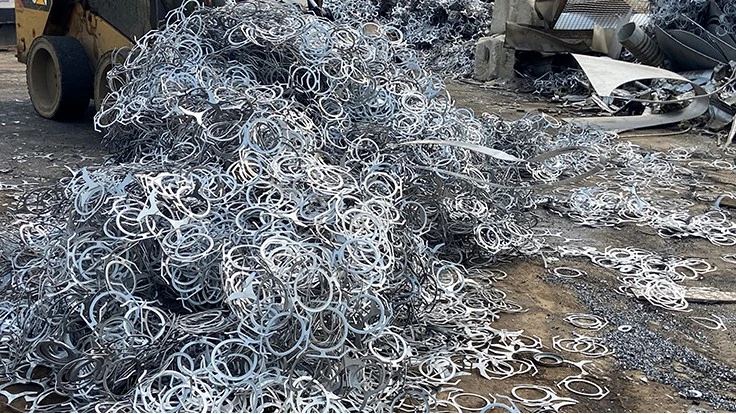
Photo by Recycling Today staff.
Two members of the Bureau of International Recycling (BIR) Non-ferrous Metals Division board conveyed frustration with policy makers in the European Union and elsewhere for creating scrap trade barriers at the very time scrap can help metals producers shrink their carbon footprints. The division met in late May at the BIR World Recycling Convention in Barcelona.
Murat Bayram, who works from Germany for United Kingdom-based EMR Ltd., pointed to the looming danger of introducing a ban on scrap exports through revision of the EU Ordinance on Transboundary Shipments of Waste.
Adverse impacts to recycling profitability and capacity may result during periods when there is insufficient demand from European consumers for material, Bayram said, adding, “The solution is to keep markets free."
Bayram continued, “This really is five minutes to 12:00; we won’t be able to invest in technologies, we will not be able to recover the materials.” He urged those in attendance to contact policymakers to clarify the benefits of international scrap trading.
Non-ferrous Metals Division board chair Dhawal Shah of Mumbai-based Metco Ventures said there is visible growing support from governments for circular economy concepts, sustainability and decarbonization. Yet, Shah said, there was “a disconnect” when it comes to government policies directed at some of the very businesses that were delivering on this “greener” agenda, including importers and exporters of scrap material. He expressed the hope that the future would bring “a better understanding” among policymakers.
Inka Guixà, chief executive of Spain-based copper producer and melting technology provider La Farga, commented that the global scrap market “needs to be free.” She said if society was demanding sustainability, “this means that competitiveness needs to have free access.”
Shah told assembled delegates that every external development—from the COVID-19 pandemic to conflict in Ukraine and from higher energy costs to rising inflation--had “become a reason for hyper-volatility.”
Faced with such “chaos” within metal markets and the wider world, Shah had the following advice for recyclers: “You need to be on top of your risk management.”
Bayram listed what he called three dominant themes mentioned by industry contributors: energy cost inflation; lack of labor, including “huge problems in finding truck drivers”; and falling secondary aluminum prices tied to struggles within the automotive industry.
Demand prospects overall, however, appear bright. Guixà pointed to projections of a doubling in copper demand to 60 million metric tons per year by 2050, driven by the metal’s role in sectors such as renewable energy, electrification, e-mobility and digitalization. This represents “a very good opportunity for the recycling sector,” she said.
Some 14 million tons of copper are generated annually and yet perhaps only 9 million metric tons is converted to metal. Thus, Guixà said, “There are 5 million [metric] tons that are lost along the way.” One challenge, she said, is to innovate to maximize recovery while also meeting finished metal quality requirements.
Tom Eng, a senior vice president with technology provider Tomra Recycling, was bullish about growth prospects for aluminum. Demand in Europe alone was expected to jump 40 percent between 2018 and 2050, he said, driven mainly by the transportation, building/construction and packaging sectors.
Eng said established and emerging technologies, including X-ray transmission and laser-induced breakdown spectroscopy, can deliver the higher qualities of scrap that would be required to feed this demand growth. Improved sorting brings many benefits for recyclers, he remarked, including higher margins and reduced transportation costs resulting from increased sales to nearby melt shops.
The 2022 BIR World Recycling Convention was May 22-25 in Barcelona.
Get curated news on YOUR industry.
Enter your email to receive our newsletters.
Latest from Recycling Today
- Unifi launches Repreve with Ciclo technology
- Fenix Parts acquires Assured Auto Parts
- PTR appoints new VP of independent hauler sales
- Updated: Grede to close Alabama foundry
- Leadpoint VP of recycling retires
- Study looks at potential impact of chemical recycling on global plastic pollution
- Foreign Pollution Fee Act addresses unfair trade practices of nonmarket economies
- GFL opens new MRF in Edmonton, Alberta






